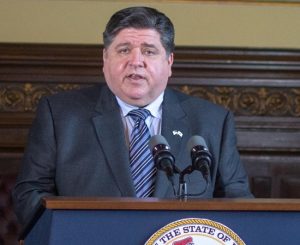Pritzker moving away from tax hikes, turns to closing ‘corporate tax loopholes,’
Jerry Nowicki Capitol News Illinois — February 9, 2021
Gov. J.B. Pritzker is pictured in his office during the lame duck legislative session in January. (Capitol News Illinois file photo)
SPRINGFIELD – Gov. J.B. Pritzker’s office says he will propose a budget with no tax increases for the upcoming fiscal year, and the deficit is now projected at about $2.5 billion less than previously thought.
The governor introduces his proposed budget each year, but lawmakers in the General Assembly have the ultimate say as to what funding gets appropriated. Pritzker is scheduled to outline his full budget proposal on Feb. 17 in a virtual message, although details have not been finalized, according to his office.
In a brief, 250-word outline of the upcoming fiscal year 2022 budget proposal, the governor’s office said the state will keep spending flat from a year ago while closing “corporate tax loopholes” worth $900 million. The outline did not identify any specific loopholes.
Pritzker’s office said the FY22 budget will continue to include $700 million in state government spending cuts his administration initiated this year upon the failure of the graduated income tax constitutional amendment.
Cigarette taxes would be moved into the general revenue fund as well, according to the outline. In 2019, the General Assembly increased the tax on a pack of cigarettes to $2.98, up from $1.98. The tax increase was to go to the state’s Rebuild Illinois capital infrastructure plan.
There would also be no new state funding for the evidence-based funding model for K-12 education, according to the outline.
“Significant federal funding for education will provide additional support for schools while the state maintains its existing investment, and the governor is committed to ensuring that education is fully funded in future years,” the governor’s office wrote in an email.
The evidence-based funding model was passed in 2017 and called for an added $350 million in state investment in schools each year to be driven toward the districts that were furthest from funding adequacy based on a number of factors. But this year will mark the second straight in which the state did not direct any new money toward the formula.
“There is no question that this budget will include painful choices, but as the effect of the pandemic diminishes over the coming months, the governor will continue to focus on economic recovery for the hardest hit,” the governor’s office said in an email.
In a bit of good news, however, the deficit for FY22 is now projected to be $3 billion, down from the $5.5 billion of previous estimates, as the state’s economy “performed more strongly than expected.” The governor’s office also cited his decision to expedite repayment of $700 million borrowed from the federal Municipal Liquidity Facility program as a contributing factor to the lowered anticipated deficit.
“The governor will also continue to advance long-term structural budget improvements that continue the stronger fiscal trajectory Illinois was on before the pandemic,” his office said in an email.
The new fiscal year begins July 1 and lawmakers generally look to pass the annual operating budget by the time of the scheduled adjournment of the General Assembly on May 31 each year.
“The governor looks forward to collaborating with the General Assembly to finalize a responsible state budget,” his office said in an email.
Jnowicki@capitolnewsillinois.com







